
- Home
- About Us
- Sustainability
- Investors
- News
- People & Culture
-
Regions
Artificial intelligence (AI) is potentially the most powerful tool for inclusive growth in Africa, but the continent is in a race against time and must act with urgency to overcome the risk of further inequality and the creation a digital underclass. This is according to the continent’s largest mobile operator MTN Group.
“We must be obsessed and paranoid about not being left behind,” MTN Group President and Chief Executive Officer Ralph Mupita told The Kgalema Motlanthe Foundation (KMF) Inclusive Growth Forum over the weekend.
He said Africa’s path to inclusive AI required speedy action on six fronts.
Firstly, AI needs more abundant electricity supplies to drive economic growth. The IEA has estimated that Africa’s energy and climate-related goals by 2030 require annual investments of more than US$200 billion. The International Monetary Fund has said that all data centres combined use as much power as some of the world’s largest economies, and data centre power demand may triple by 2030.
As Africa has less than 2% of global data centre capacity, Mupita said it needs to invest heavily in digital infrastructure, beyond investment in fibre and subsea cables. The International Telecommunication Union has said that Africa needs around US$96 billion until 2030 to plug the digital infrastructure capex gap.
Thirdly, Africa needs to speed up the development of its own large language models (LLM) to power AI-driven solutions for its 1.5 billion people. There are more than 2 000 distinct African languages and Mupita said that fewer than 2% of them are supported by mainstream LLMs.
He was building on comments he made in New York in September on the sidelines of the United Nations General Assembly, when he took up a call to action from Nigeria for MTN Group to support the collection of datasets of African languages, including funding academic research into the continent’s languages.
This followed the launch of the Nigerian Atlas for Languages & AI at Scale (N-ATLAS) – an open-source multilingual LLM designed to understand and generate Nigeria’s diverse voices and create datasets for AI solutions.
Mupita told the KMF gathering that Africa must act with urgency to develop strong digital and AI skills. “This is an opportunity to enable Africa’s rich pipeline of youth, which will make up the world’s largest workforce by 2050,” he said, adding that by 2030, there would be an estimated 230 million digital jobs in sub-Saharan Africa.
“We must ensure that new jobs and augmented jobs are greater than the jobs lost, particularly with the youth divided that Africa will have.”
Calling AI a tool to solve Africa’s unique challenges, particular in high impact sectors, Mupita said Africa needed to combine traditional AI and generative AI for the greatest value across key use cases in key sectors such as healthcare, education and agriculture.
Finally, he said if Africa was to turn its ambition into reality and create – not merely consume – AI, partnerships were essential. “To give African AI initiatives scale and joint success, governments, the private sector and civil society must partner on policy, data governance and skills development. And we must do this without delay.”
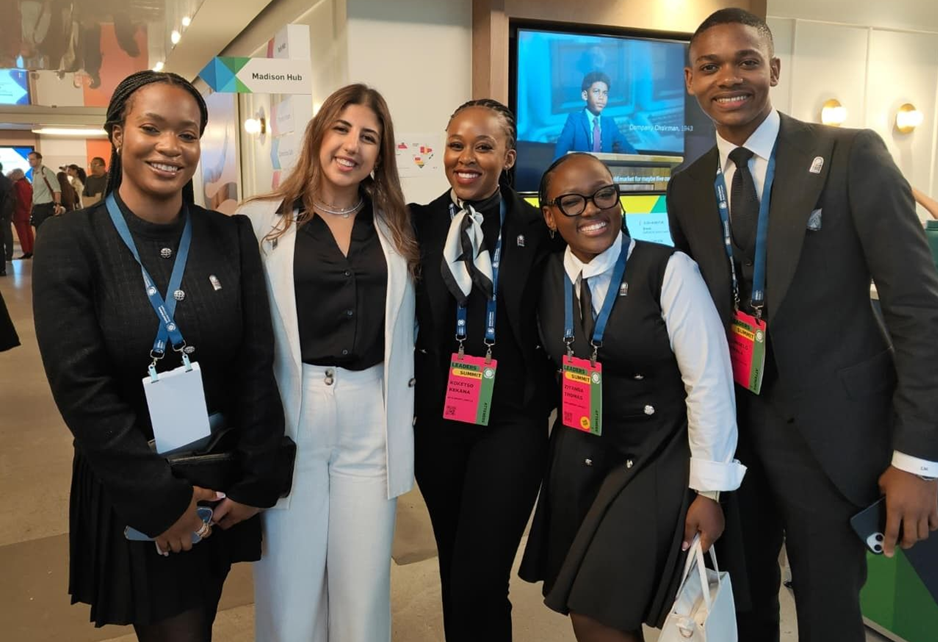
With only five years left to achieve the United Nations Sustainable Development Goals, the call for acceleration has never been more urgent. Progress remains uneven across the globe, and Africa in particular faces pressing challenges of inequality, youth unemployment and safety. It is against this backdrop that the UN Global Compact hosted its annual SDG Innovation Accelerator Programme during the United Nations General Assembly, showcasing bold business-led solutions that can help drive faster progress.
Representing South Africa, MTN’s graduate team won top honours and was selected as one of only two African teams to present their innovation at the UN Global Compact Leaders’ Summit in New York. Their project, an AI-powered solution to protect children online, responds directly to the alarming rise in digital harms, with child sexual abuse material increasing by more than 6000 percent globally and cyberbullying up by 450 percent. The solution is designed to shield children from predators, limit exposure to harmful content and reduce online bullying. It directly advances SDG 16.2 on ending abuse, exploitation and violence against children, while contributing to SDG 3 on health and well-being.
Dr Achieng Ojwang, Executive Director of UN Global Compact South Africa, stressed the importance of momentum. “The SDGs will not be met at the current pace, which is why programmes like the Accelerator are critical. They empower young professionals to create the type of bold, scalable solutions that can fast-track progress. The MTN graduates demonstrated that Africa is not only contributing but leading in tackling issues such as child online safety.”
The project was developed by graduates Lungelo Gwala, Senam Tsormetsri, Ziyanda Thomas and Koketso Kekana. As the youngest participants in the Accelerator, they exemplify the dedication and ingenuity of Africa’s youth. With the support of mentors including Asanda Nkungwana, MTN Group Sustainable Product Development Lead, Lazarus Mosako and Maanda Rashaka the UNGC Mentorship and Coaching team, the team transformed their concept into a viable solution with potential for large-scale impact.
Reflecting on their journey, Lungelo Gwala noted: “The Accelerator gave us the chance to show that African ideas can help accelerate progress on the SDGs. Representing South Africa at the UN reinforced that our generation has the power to shape a safer digital future.” Ziyanda Thomas added: “Being part of a global platform reminded me that Africa’s voice must not only be heard it must lead. YelloGuard may be a modest innovation today, but its potential to safeguard millions of children across the continent is profound.”
This recognition not only highlights MTN’s commitment to youth empowerment but also underlines Africa’s pivotal role in driving the acceleration needed to achieve the UNSDGs by 2030.
MTN Group, in partnership with the University of Johannesburg (UJ) and the African Editors Forum (TAEF), today launched the Pan-African Media Innovation Programme (MIP), a continental initiative to equip journalists with the skills, tools, and networks required to navigate a rapidly changing information environment.
The programme builds on the success of the MTN Nigeria MIP, established in 2022, and now extends the model to media practitioners across MTN’s footprint. It offers a certified 12-week curriculum, delivered independently by UJ and TAEF, which combines online academic modules with in-person immersion in Johannesburg. Participants will explore digital transformation, the sustainability of independent media, ethics and law, entrepreneurship, and the impact of platforms and emerging technologies on the information ecosystem. Industry masterclasses, newsroom visits, and innovation projects will connect academic learning to practice.
The launch comes at a time when Africa, like the rest of the world, faces rising levels of fake news, coordinated disinformation, and fragile business models. Strengthening media resilience is critical to advancing the African Union’s Agenda 2063 goal of inclusive, informed, and democratic societies. For MTN, the initiative also aligns with its role as a trusted partner to the countries where it operates, ensuring that connectivity supports not only digital access but also the institutions that safeguard trust.
Speaking at the launch, Nompilo Morafo, MTN Group Chief Sustainability and Corporate Affairs Officer said, “Africa’s digital future depends on both the infrastructure we build and the strength of the institutions that foster trust and accountability. Through the Pan-African MIP, we are investing in media capacity and innovation alongside respected academic and editorial partners. Together we aim to strengthen the information ecosystems that are essential for resilient democracies and inclusive growth.”
UJ spokesperson added, “Our partnership ensures that the programme is rooted in academic rigour while responsive to the realities of newsrooms. Equipping journalists with the skills to navigate disruption and build sustainable models is critical for the future of the profession.”
African Editors Forum spokesperson said, “Editors across Africa welcome this initiative. Independent media are indispensable to democratic governance, and partnerships such as this provide a pathway to greater resilience, collaboration, and trust.”
The launch, held at MTN’s Innovation Centre in Johannesburg, coincided with a visit from Nigerian journalists representing the MIP Alumni Association, symbolising the transition from a national programme to a Pan-African platform. The first cohort of fellows will begin in 2026.
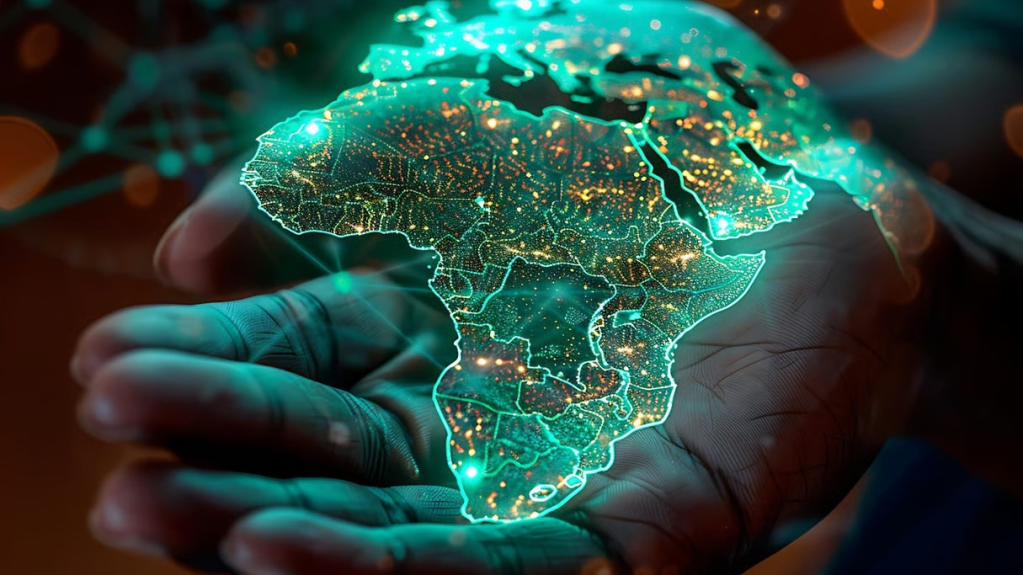
In November 2024, MTN South Africa launched the Icon 5G smartphone, priced at R2,499 (about $138). Designed to make high-speed internet affordable to underserved populations, the launch was not just a nod to corporate social responsibility (CSR); it was also a strategic move to tap into an underutilised market of digital users. As Sub-Saharan Africa remains one of the least connected regions globally, efforts like this highlight how CSR and business growth are increasingly intertwined in the telecom sector.
For MTN, CSR has become an entrenched means of ensuring long-term sustainability and profitability by creating shared value for communities and stakeholders. Understanding stakeholder priorities and measuring community impact has become central to this approach.
Telecommunications companies like MTN are now operating in an environment where connectivity is no longer a luxury, but a necessity. According to the GSMA’s 2023 report, closing the digital use gap in Africa could generate up to $3.5 trillion for the global economy by 2030. Yet, barriers remain—including in terms of cost, infrastructure, and digital skills—holding back the sector’s growth potential.
The fundamental question facing companies operating on the continent is: how do we combine economic performance with real social impact? For MTN, this balance is now an intrinsic feature of its African operating model.
This balance between purpose and profit manifests differently across MTN’s markets, with each country CEO adapting community development strategies to local needs. Mitwa Kaemba Ng’ambi, who previously served as CEO of MTN Cameroon and now leads MTN Côte d’Ivoire as CEO, exemplifies this localised approach. The MTN Foundation’s systematic community investment model underpins much of this work: “It’s funded every single year by 1% of our profits, and with that 1% of profits, we have three primary areas of focus. One, of course, is education. We also have focused around women empowerment,” she explains. Beyond traditional CSR, her market-specific strategies have seen MTN build a mobile money merchant network of over 300,000 in Côte d’Ivoire alone, with women representing a significant portion of these digital entrepreneurs—demonstrating how targeted community programmes can drive both social impact and business growth
Affordable technology: Preparing the customers of tomorrow
The Icon 5G smartphone addresses one of the major obstacles to connectivity in Africa: affordability. By offering this terminal at a competitive price, MTN demonstrates its in-depth understanding of long-term growth dynamics. By democratizing access to 5G, the operator anticipates the emergence of a new generation of users for its high-speed networks.
Stephen Blewett, Managing Director of MTN Ghana, explains that connectivity fosters economic inclusion: affordable equipment is a gateway to digital ecosystems, and every new user represents an opportunity for growth for MTN – whether through mobile money, e-commerce or other digital services.
This is in line with the company’s Ambition 2025 strategy, which aims to strengthen growth in the digital and financial services sectors through targeted investments and increased customer engagement.
Education: developing digital skills and literacy
Among the most ambitious community development projects is the Digital Hub, a $25 million project currently under construction in Ghana. Ultimately, this technology hub will train more than 200,000 people in digital skills and create more than 100,000 jobs in three years. It will offer state-of-the-art workspaces to support the growth of local tech and promote the emergence of a digital ecosystem in the health, agriculture and education sectors.
However, faced with the massive challenge of youth employment in Africa — more than 200 million young people, the majority of whom have no training or skilled employment — the issue goes far beyond that of infrastructure. The emergence of technologies such as artificial intelligence further accentuates the urgency to act.
This project embodies a model that can be replicated across MTN’s different markets. The MTN Foundation has already supported more than 90 educational projects: ICT and robotics centres, classrooms, dormitories, scholarships, etc.
Watch: Mitwa Kaemba Ng’ambi, of CEO MTN Côte d’Ivoire talks about MTN’s support for young entrepreneurs building Africa’s digital future.
However, the issue of scale remains. The launch in 2022 of the Skills Academy in Zambia offers an extensible model, with training in digital and financial literacy. The economic argument is clear: better equipping communities means strengthening customer relations.
Health: between social utility and growth drivers
Health is another area where business strategy and community engagement come together effectively. The MTN Foundation has invested in 55 health projects, including health centres, maternity wards, blood banks, medical equipment and awareness campaigns.
These interventions address critical needs while positioning MTN as a trusted player in the field of public health. By illustrating the usefulness of digital infrastructures in access to care, they also pave the way for strengthened partnerships with governments and NGOs.
Mobile clinics and prevention campaigns have played a key role during health crises, highlighting MTN’s growing role as a provider of essential services.
Sustainability: Reconciling environmental commitment and operational efficiency
MTN has committed to achieving carbon neutrality by 2040 — a bold ambition, but based on a strong economic rationale. More than 3,000 solar-powered sites have already been deployed, reducing both the carbon footprint and long-term operational costs.
MTN’s sustainability strategy is not limited to climate. It also helps to strengthen the resilience of its operations. By reducing its dependence on fossil fuels, the company frees itself from fluctuations in the energy markets and guarantees the continuity of its services in difficult contexts.
Policy Advocacy: Protecting Infrastructure for Growth
In November 2024, Google’s Charles Murito advocated for fiber optic cables to be considered critical infrastructure — an initiative supported by MTN. Theft and vandalism of facilities remain major threats, generating additional costs and compromising the quality of services.
The strengthening of the regulatory framework benefits the entire sector, while ensuring the sustainability of investments and customer loyalty through an increased quality of service.
Measuring impact: from responsibility to accountability
MTN’s social commitment is reflected in a rigorous impact measurement policy. The company has 166 projects in the fields of health and education, with more than 4.5 million direct and indirect beneficiaries. These figures illustrate not only a civic commitment, but also the economic and social impact of its actions.
However, measuring the long-term impact remains complex. Programs such as mobile clinics or solar infrastructure require constant monitoring and funding to ensure their sustainability.
Challenges to be addressed
Despite these successes, some questions remain:
A balance between economic performance and social impact
From accessible smartphones to educational hubs and healthcare projects, MTN’s CSR initiatives demonstrate the ability of telecom operators to reconcile social transformation and economic performance. By expanding their customer base and forging lasting partnerships, these companies strengthen their brand equity while exploring new growth drivers.
By responsibly addressing systemic challenges, MTN is setting a sector benchmark and charting a path to an inclusive, connected and prosperous Africa. Integrating community development into business strategy is, more than ever, a viable model for growth in emerging markets.
Sources:
GSMA – The State of Mobile Internet Connectivity Report 2024
GSMA – The Mobile Economy Sub-Saharan Africa 2023
Matsh – Youth Employment Statistics in Africa (2023)
World Bank – Africa Overview (2024)
MTN.com
Published on Jeune Afrique 20 July 2025: The role of telecoms in community development: CSR that goes beyond connectivity
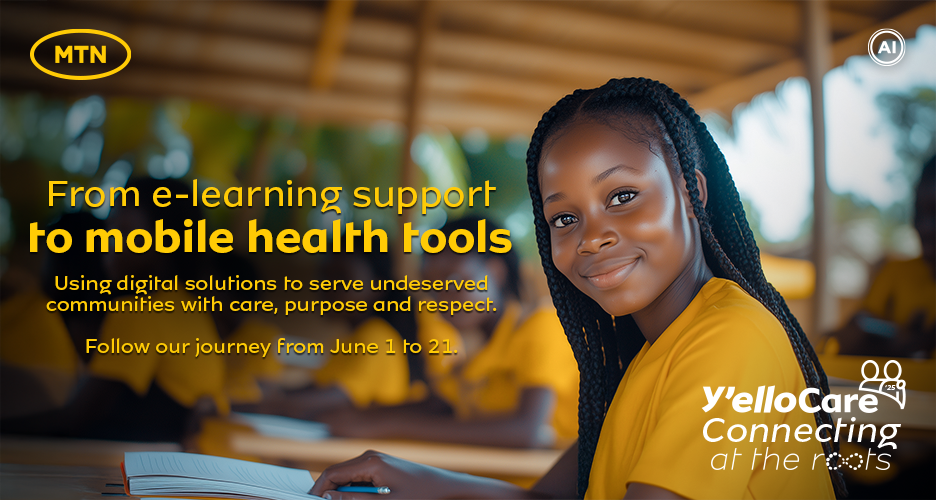
MTN Group is pleased to announce the 2025 edition of 21 Days of Y’ello Care, our highly anticipated flagship employee volunteerism campaign, taking place from 1-21 June 2025.
Now in its 18th year, Y’ello Care continues to demonstrate the power of employee-led action to drive meaningful change across the communities we serve. Since its inception, the campaign has mobilised thousands of MTN employees to support impactful initiatives focused on education, health, youth development, and economic empowerment.
Each year, the campaign evolves to reflect the most pressing needs of society, while remaining grounded in our commitment to enable the benefits of a modern connected life for everyone. Over the past 6 years, we have reached the lives of 107,034 people across our communities through the impact of 14,376 MTN volunteers completing 56,306 cumulative hours of community engagement.
This year’s theme, “Connecting at the Roots – Connecting communities through the use of digital tools,” responds to the ongoing challenge of digital exclusion, particularly in rural, remote, and underserved areas. Across many parts of Africa, limited connectivity continues to constrain access to education, healthcare, financial services, and economic opportunity. Women, youth, persons with disabilities, and displaced populations are disproportionately affected.
Y’ello Care 2025 will see MTNers across our markets implement practical, community-led initiatives that leverage technology to unlock connectivity to bridge these gaps.
“Y’ello Care reflects our belief that real progress begins at the grassroots level. In 2025, we are focusing our efforts on the communities that remain on the margins of digital access and connectivity. By applying technology in ways that are practical, inclusive, and sustainable, we are working to ensure that no one is left behind,” said Nompilo Morafo, MTN Group Chief Sustainability and Corporate Affairs Officer. “Our people remain the driving force behind this campaign, and their continued commitment to serving with purpose is what makes Y’ello Care a true embodiment of MTN’s values.”
In line with MTN’s values, the campaign prioritises meaningful partnerships, responsible delivery, and inclusive engagement. Through trusted collaborations with community stakeholders, we aim to develop practical solutions that are responsive to local contexts, respectful of community aspirations, and inclusive of those most often excluded from digital progress.
Through Y’ello Care, MTN reaffirms its belief in the transformative power of technology and in the ability of our people to be agents of positive change. We look forward to working together with communities and partners to deliver meaningful, sustainable impact where it is needed most.
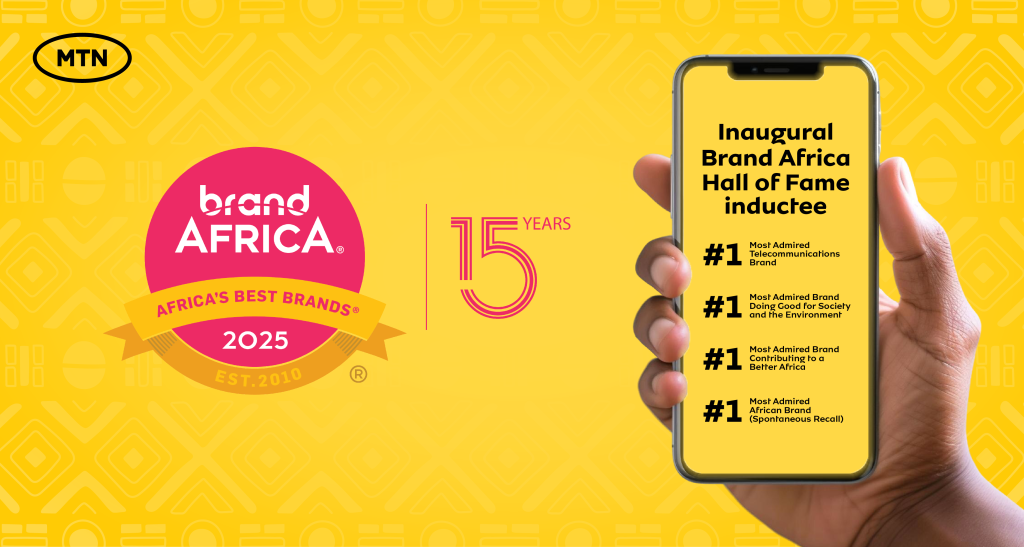
MTN Group has been inducted into the inaugural Brand Africa Hall of Fame “in recognition of its transformational impact on African consumers and its role in shaping a positive African narrative”. MTN was also recognised as the #1 Most Admired African Brand Contributing to a Better Africa; the #1 Most Admired African Brand (spontaneous recall); the #1 Most Admired Brand Doing Good for Society and the Environment; and #1 Most Admired Telecommunications Brand.
The Hall of Fame honour, introduced this year by Brand Africa, acknowledges brands that have demonstrated sustained excellence and influence on the continent over the past decade. MTN’s induction reflects its ongoing commitment to enabling digital access, expanding financial inclusion, and contributing meaningfully to Africa’s development.
The announcement was made alongside the release of the 2025 edition of the Brand Africa 100 rankings – an annual, independently conducted survey spanning more than 30 African countries and representing more than 85% of the continent’s population and GDP.
“It is an honour to be inducted into the Brand Africa Hall of Fame and to be named the most admired African brand contributing to a better Africa, the most admired African brand by spontaneous recall, as well as the brand most admired for doing good for society and the environment,” said Ralph Mupita, MTN Group President and CEO.
“That this recognition comes during Africa Month gives it added significance. It reflects the progress we continue to make as a continent and the role trusted brands must play in advancing inclusive, digitally enabled growth. We are grateful for the confidence placed in MTN by the people we serve and remain committed to delivering meaningful impact.”
Mupita also acknowledged the collective effort behind the brand’s success, thanking MTNers, partners, and other stakeholders across the continent for their role in making this recognition possible.
MTN operates mobile networks in 16 countries. Since 2021, the company has been guided by its Ambition 2025 strategic intent of Leading digital solutions for Africa’s progress. This underscores MTN’s commitment to driving digital and financial inclusion and fostering innovation across the continent.
Further validating its brand leadership, MTN was recently ranked once again as South Africa’s most valuable brand. The accolade was made in the 2025 Brand Finance Top 100 Report, which accorded MTN a brand valuation of R50.7 billion. MTN has held this position every year since the survey’s inception in 2012.
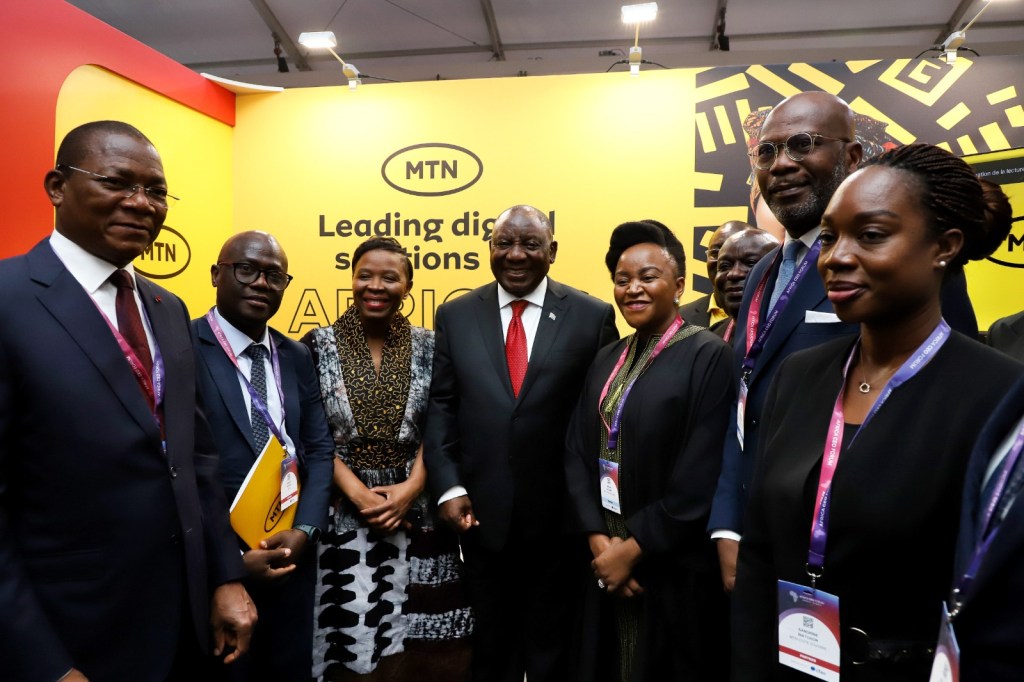
As part of our work to deepen stakeholder relations and partnerships for Africa’s progress, MTN Group is a platinum sponsor of the Africa CEO Forum, which brings together the continent’s most influential decision-makers for two days of meetings on the private sector’s key role in accelerating Africa’s development.
The 12th edition of the annual summit is taking place in Abidjan on 12–13 May 2025. Some 2 000 business leaders, investors and policy makers are in attendance to shape practical strategies to expedite Africa’s economic transformation.
The theme for 2025 is ‘Africa in a transactional world: Can a new deal between state and private sector deliver the continent a winning hand?’. It recognises the need for governments to strike a new deal with the African private sector, anchored on three pillars: an improvement of governance and accountability; targeted public policies to address Africa’s structural challenges; and the accelerated implementation of the African Continent Free Trade Agreement (AfCFTA).
“At part of our shared value priority to support Africa’s progress, we at MTN seek to align with the priorities of our continent and nation states and to actively engage governments and regulators to help shape industry dynamics,” said MTN Group Chief Sustainability and Corporate Affairs Officer Nompilo Morafo.
“MTN’s participation at the Africa CEO Forum reflects our nation states programme and our commitment to work together to enable inclusive growth,” she added, noting that escalating tensions in world geopolitics present headwinds to Africa’s budding economic recovery. “We believe the continent’s sustainable progress will come from trusted partnerships, coherent policy environments and shared investment in the systems that power Africa’s digital and economic future.”
As part of the Forum programme, MTN Group Senior Vice President: Markets, Ebenezer Asante, is participating in a panel discussion exploring tax policy and resource mobilisation. The session focuses on how public and private sector stakeholders can consult and collaborate to ensure fiscal environments that support both domestic priorities and the stability required for sustained investment.
MTN Côte d’Ivoire CEO Mitwa NG’ambi is contributing to a strategic roundtable on Africa’s digital transformation. This is looking at strategies to enhance network resilience and accelerate infrastructure deployment – particularly in underserved areas – and the role of policymakers in fostering an investment-friendly environment that accelerates digital transformation.
MTN Group’s sponsorship and participation at the Africa CEO Forum underscore our commitment to building a more connected, inclusive and prosperous Africa.
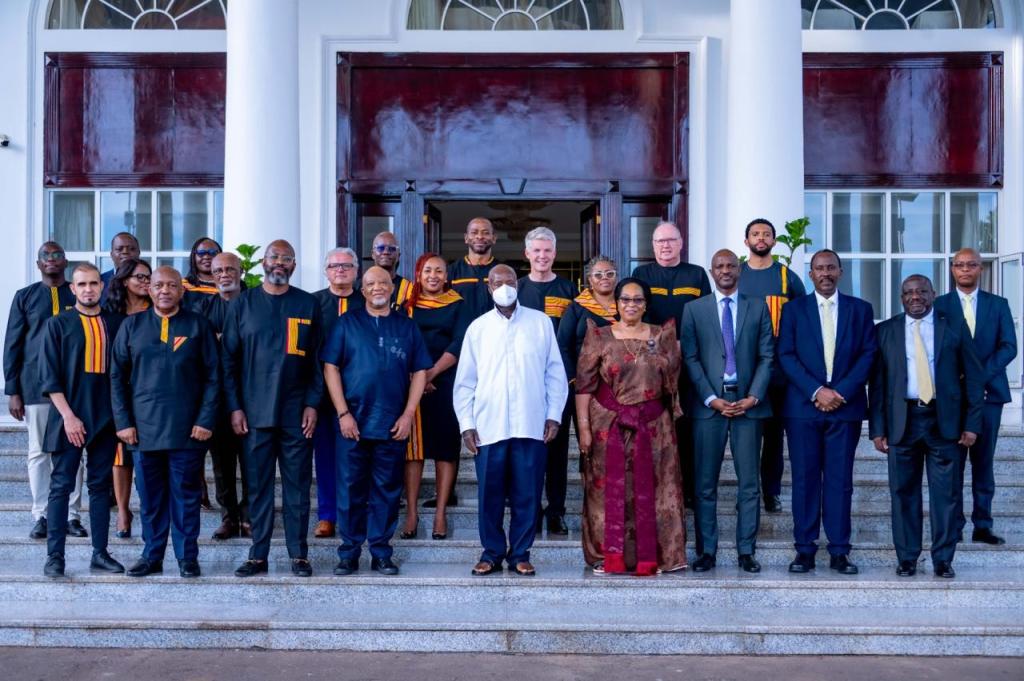
MTN Group this week convened its annual Chairmen’s Forum in Uganda, bringing together Board Chairs from its operating companies and senior executives from across the business. Held in Kampala, the Forum serves as a key leadership platform to reflect on strategic progress, strengthen alignment, and advance the Group’s ambition to lead digital solutions for Africa’s progress.
On the sidelines of the Forum, the MTN Group delegation, led by Group Chairman Mcebisi Jonas and Group President and Chief Executive Officer Ralph Mupita, engaged with national leaders and key stakeholders to reinforce the Group’s long-standing commitment to Uganda as a strategic market.
These engagements included a high-level meeting with His Excellency President Yoweri Kaguta Museveni at State House, Entebbe, as well as a stakeholder dinner hosted by MTN, attended by senior government officials.
During the State House meeting, President Museveni welcomed MTN’s continued investment and emphasised the importance of targeting sectors that generate employment and expand the economy. “If people have jobs and incomes, they will buy more phones and use them more,” he said. “That’s why we must invest in the four key sectors of wealth and job creation: commercial agriculture, manufacturing, services, and ICT.” He further encouraged MTN to explore cross-border investment as a means of promoting regional integration and intra-African trade.
Uganda holds a distinct place in MTN’s history as the first country outside South Africa where the Group secured a telecommunications licence. Granted in 1998, this licence marked the beginning of MTN’s international expansion, laying the foundation for what would become one of Africa’s leading digital infrastructure and platform businesses. Today, MTN Uganda stands as one of the Group’s most important markets, commercially and developmentally.
Mcebisi Jonas, MTN Group Chairman, expressed appreciation for the long-standing collaboration between MTN and the Government of Uganda. “We just came today to say thank you very much for the support you have always given us. We have had excellent collaboration from the regulators, and MTN is not here for the short term—we are here for the long haul,” he said. He also emphasised MTN’s interest in strengthening trade and business linkages between Uganda and South Africa, and highlighted the Group’s broader capacity to support national development. “We believe there is real opportunity to help Ugandan businesses enter the South African market, and that is something we can explore further.”
As MTN Group continues to drive the acceleration of Africa’s digital future, Uganda remains a key partner, demonstrating the enduring value of early investment, collaborative nation-building, and a shared commitment to inclusive and sustainable progress.
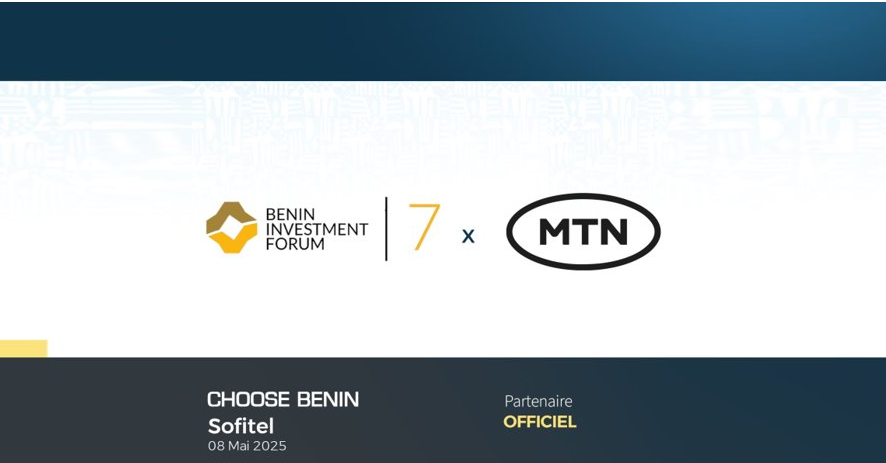
The 7th edition of the Benin Investment Forum (BIF) will take place from 8 to 9 May 2025 at the Sofitel Hotel in Cotonou, bringing together leaders from government, business, and civil society to foster economic cooperation, attract foreign direct investment, and promote inclusive development. Organised by the Government of Benin through the Investment and Export Promotion Agency (APIEX) and the Benin Chamber of Commerce and Industry, the Forum comes at a crucial moment in Benin’s development, underpinned by structural reforms and macroeconomic stability.
MTN Group proudly joins the Forum as the Platinum and Headline Sponsor. This strategic partnership follows MTN Group President and CEO, Ralph Mupita’s market visit to Benin in January 2024, where the company reaffirmed its longstanding commitment to the country’s development as a trusted partner. MTN’s participation at BIF 2025 will be led by Senior Vice President Markets Ebenezer Asante, who will deliver a keynote address at the Opening Ceremony on the topic “MTN: Partner in Africa’s Development.” He will be joined by MTN Benin CEO Uche Ofodile and MTN Group Chief Sustainability and Corporate Affairs Officer Nompilo Morafo, both of whom will participate in high-level discussions on finance, the future of technology, and women’s leadership in business.
MTN will also take the lead in hosting the exclusive MTN Investment Night, a high-level networking engagement aimed at facilitating meaningful dialogue among investors, policymakers, and senior business leaders. As part of its broader contribution to the Forum, MTN will collaborate with the Benin Ministry of Trade and Commerce to evaluate start-up pitches, spotlighting innovative solutions from emerging entrepreneurs. Additionally, the Group will deliver an inspirational leadership masterclass, curated to inspire and equip the next generation of African business leaders with insights drawn from MTN’s journey of growth and transformation across the continent.
Having operated in Benin for more than 25 years, MTN has made significant contributions to the country’s digital infrastructure, financial inclusion, and social development. The Group has committed over $215 million in new investments through 2026, including the rollout of 5G services, expansion of fibre connectivity, and the construction of a new MTN Benin headquarters. MTN’s impact also extends into health, education, and entrepreneurship through the work of the MTN Foundation, reinforcing its belief that digital access is key to unlocking national and regional progress.”
Commenting on MTN’s commitment to the Benin Investment Forum and the country, Ebenezer Asante, MTN Group Senior Vice President, Markets stated: “Our presence at the Benin Investment Forum reflects more than sponsorship, it’s a reflection of our unwavering belief in Benin’s potential and our shared journey toward inclusive digital transformation. Through strategic partnerships rooted in national development goals, MTN is proud to be a catalyst for progress, investment, and innovation in Benin and across the continent.”
MTN’s participation in the Benin Investment Forum 2025 exemplifies the company’s belief that inclusive, resilient growth must be rooted in strategic collaboration between the public and private sectors. As a partner of choice to African governments, MTN continues to play a leading role in building the infrastructure, capabilities, and ecosystems required for nations to thrive in a digital world. Through its involvement in BIF 2025, MTN reaffirms its commitment to Benin’s development journey and to advancing Africa’s digital and economic integration.
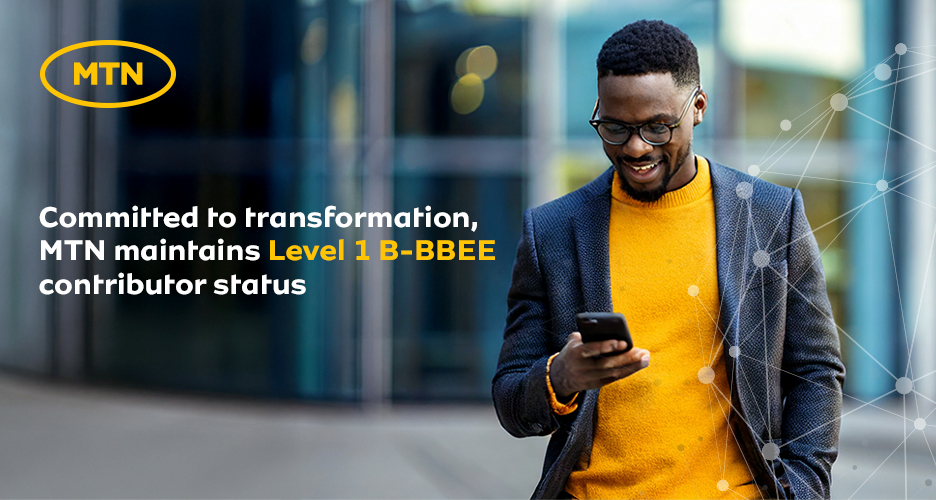
A pioneer in transformation in South Africa, MTN Group and major subsidiary MTN South Africa (MTN SA) each maintained a Level 1 Broad-Based Black Economic Empowerment (B-BBEE) contributor status in 2024.
MTN’s annual B-BBEE compliance report, compiled by an independent verification agency, underscored our efforts to drive inclusive growth and empowerment through deliberate and targeted interventions in the year.
“Our commitment to transformation and focused execution has yielded measurable successes across several elements of the B-BBEE scorecard, including notable improvements in management control, skills development and preferential procurement,” said MTN Group President and CEO Ralph Mupita.
“As a result of our recruitment and talent management strategies, we increased Black representation in management across all levels and enhanced female representation on the Board of Directors. This is part of our goal of achieving gender equity by 2030,” he added.
MTN SA CEO Charles Molapisi was pleased with the results: “At MTN South Africa, we see our Level 1 B-BBEE achievement not just as a milestone, but as a reaffirmation of our purpose to lead with impact. Transformation is deeply embedded in our DNA, it guides how we invest, how we empower, and how we connect South Africans to real opportunities. We are proud to be part of building a future where inclusive growth drives true progress, for all.”
Despite a challenging macroeconomic environment in 2024, MTN remained committed to creating an equitable environment for previously disadvantaged individuals through our skills development programmes. We invested in building STEM capabilities to help future-proof our graduates and employees, equipping them with the tools required for the digital economy. This was achieved through structured learning, on-the-job training and mentorship.
As a significant player in the sector, we recognise our responsibility to foster inclusive and sustainable economic growth, not just as a corporate entity, but as a catalyst for positive change. Small and medium-sized enterprises (SMEs) play a key role in driving economic.